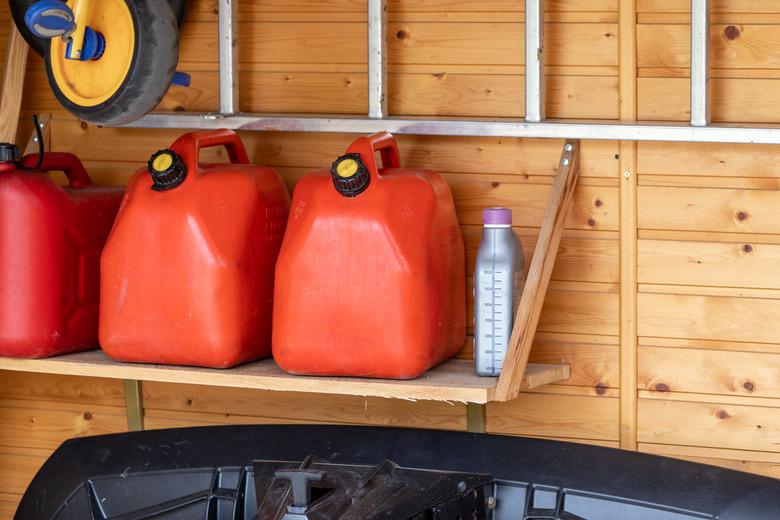How To Store Gas Cans Inside A Garage
It probably goes without saying that gasoline storage isn't something about which you can afford to be lax. Keeping one or more full gas cans in your garage is convenient if you have a gas-powered lawn mower or other lawn equipment or if you have a generator that you might need to fuel up after a storm or other natural disaster. Storing gas in your garage can be done safely but only if the space meets certain criteria and you're familiar with best practices for handling gasoline at home. Here's what you need to know about storing gas cans inside your garage.
General Safety Guidelines for Storing Gasoline
Local fire and building codes will determine how much gasoline you're allowed to keep in storage. Often, these codes allow individuals to have up to 25 gallons of gasoline on their property provided that the gas is always stored in approved containers no larger than 5 gallons.
It's critically important that any gasoline you store at home be contained in a 5-gallon spill-proof gas can in pristine condition. Keeping gas in leaky, old containers can lead to gas fumes in the garage as a best-case scenario. The worst-case scenario is a devastating fire caused by gas in a leaky container being exposed to an ignition source. Storing fuel in approved cans also makes it easy to dispose of gasoline if you ever need to bring it to your local hazardous waste collection site.
As general guidelines, bear in mind that light and heat are enemies of safe gasoline storage. Exposure to heat will cause gas to expand inside the can. Gas cans should never be stored in direct sunlight or in a place where the temperature is regularly higher than 80 degrees Fahrenheit. Gasoline should be stored in ventilated structures that aren't attached to homes or other buildings.
Storing Gasoline in a Garage
Assuming your garage isn't flooded with sunlight and isn't connected to your home and you don't live in a very hot climate, it could be safe to store gas in your garage. It's important that no kids and/or pets have unsupervised access to the garage if you plan to store gas there. Your garage should be free of ignition sources, like hot water heaters or anything with a pilot light. Gasoline should never be stored within 50 feet of anything that could ignite.
Don't store gas cans directly on your garage's concrete floor. Lay down a piece of plywood as a base beneath gas cans or store gas cans on sturdy shelves. Again, make sure not to place gasoline in the path of any uncovered garage windows.
If the conditions in your garage aren't safe enough for storing gasoline, another option is to buy a ventilated steel storage cabinet that's large enough to hold at least a few 5-gallon cans. This type of storage cabinet may be placed outdoors.
Safely Using Gasoline at Home
Anyone who plans to store gasoline at home must know how to use it safely. Before putting gas in a lawn mower or other piece of equipment, make sure the machine's engine and other components are completely cool and that no one is smoking or using any ignition sources in the area. After filling the cool engine with gas, move the gas can at least 50 feet away before starting the machine. Verify that the can's lid is tightly sealed before putting it back in storage.
Always keep a class B fire extinguisher nearby when you store or use gasoline at home. It's also a good idea to keep clay-based cat litter, sawdust, or some other absorbent material on hand in case of minor gas spills.
